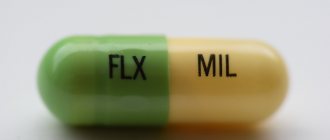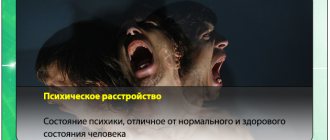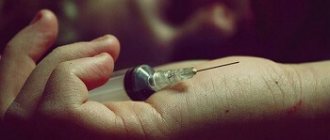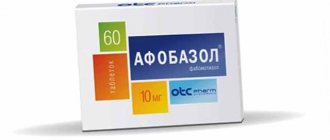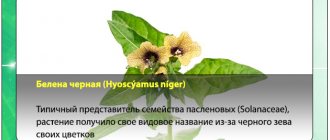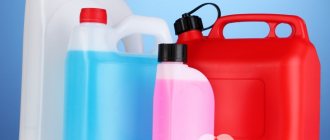Pills
Zyrtec is an antihistamine with a pronounced antiallergic and antiexudative effect on the body. The active substance of Zyrtec, cetirizine, is practically non-addictive and is easily accepted by patients of all age groups, but with an incorrectly selected dosage and uncontrolled use it leads to intoxication of the body and death.
When is the medication used?
The allergy medicine "Zyrtec" is effective for various manifestations of allergies; it is prescribed for the following allergic pathologies:
- hay fever is a seasonal allergy to pollen of certain species of trees and plants;
- allergic rhinitis and conjunctivitis, both seasonal and year-round;
- Quincke's edema;
- allergic dermatosis, including atopic dermatitis, as well as urticaria and other rashes of allergic etiology.
The drug Zyrtec is also indicated for allergic reactions to insect bites. This medicine can eliminate an acute attack of allergies in a few minutes.
Medicinal action of Zyrtec
Successfully blocks histamine H1 receptors, a competitive metabolite of the antagonist hydroxyzine, histamine. Prevents the development of allergic reactions and also facilitates their course. It has an antipruritic and antiexudative effect on the body. It has a successful effect on allergic reactions that are at an early stage of development. In addition, it limits the release of mediators that are in the last stage of development of allergic reactions. Reduces the migration of neutrophils, basophils, and eosiphils.
Significantly reduces capillary permeability, reduces the formation and development of swelling in body tissues, and relieves muscle spasms. With the help of Zyrtec, you can eliminate skin reactions that occur when the body is exposed to specific allergens and the introduction of histamine. In bronchial asthma, accompanied by a mild course, it has virtually no anticholinergic and antiserotonin effects.
Reception features
The medication should be taken orally. When treating allergic reactions in childhood (after 6 years), the recommended dosage of the medication is 20 drops, but the daily volume is given to the child in two doses, unlike adult patients, who can take the daily dose once.
When treating allergies in young children (age 2-6 years), a dosage of 5 mg of the active substance is prescribed, which is 10 drops. The medicine can be given to the baby either once or in two doses.
This medication is not intended for the treatment of infants, but some pediatricians still prescribe drops to infants. The dosage of the medication in this case should be calculated especially carefully and the specialist should take into account kidney or liver diseases in the baby, if any.
The effect of the allergy remedy in most cases is felt approximately 20 minutes after administration and continues throughout the day.
Indications for use
The pharmaceutical guidelines indicate the conditions for which Zyrtec is most effective. The main indications for the use of antihistamine are:
Zyrtec drops, instructions for use
However, there are no safety data when higher doses of cetirizine are taken with alcohol.
This medication may affect the results of allergy tests. Talk to your doctor or pharmacist if you are taking or have recently taken any other medicines, or if you are unsure about them. Due to the properties of cetirizine, interactions with other drugs are not expected. Pregnancy and breastfeeding. If you are pregnant, nursing, think you may be pregnant, or are planning to become pregnant, talk to your doctor before taking this medicine.
- year-round or seasonal rhinitis, accompanied by sneezing, itching, nasal congestion, copious discharge of mucus from the nasal cavity and lacrimation;
- Hay fever (hay fever) is a seasonal allergic disease that occurs due to hypersensitivity to the pollen of certain plants. The main symptoms are conjunctivitis and runny nose;
- Atopic dermatitis is a congenital condition that manifests itself in early childhood in the form of rashes on the skin of the face and limbs. Often worsens after the introduction of complementary foods, a new formula, or during teething;
- dry, unproductive cough of allergic origin, exhausting the little patient;
- urticaria - rash and blisters that look like a nettle burn;
- Quincke's edema, characterized by swelling of subcutaneous fatty tissue and epithelium. Dangerous due to a sharp deterioration in the child’s well-being and suffocation;
- chicken pox, or chickenpox (used to relieve itchy skin).
If a child has developed a life-threatening condition (an attack of suffocation, swelling of the larynx), then Zyrtec can be given without a doctor’s prescription. In other cases, consultation with a specialist is required.
Casual use of the drug during pregnancy does not cause harmful effects on the fetus. However, the medicine should only be used when necessary and with your doctor's approval. Cetirizine is excreted in breast milk. Driving and operating machines.
If in doubt, consult your doctor or pharmacist. The oral solution should be swallowed. Children from 6 to 12 years old. Children from 2 to 6 years old. 2.5 mg twice a day, i.e. 2.5 ml oral solution twice daily. If you have severe kidney disease, ask your doctor or pharmacist, who may adjust your dose accordingly.
Symptoms of Zyrtec overdose in a 2 or 3 year old child
There are no medications in medicine that are absolutely safe, so during treatment it is extremely important to follow doctors’ recommendations and doses of substances, especially when it comes to children under 3 years of age. An overdose of Zyrtec in a child can cause not only serious conditions, but sometimes even extremely dangerous ones. Symptoms include the following disturbances in general health:
- the child becomes overly inhibited and drowsy, his consciousness is confused;
- the baby has digestive disorders;
- severe dizziness occurs, which is often accompanied by general weakness and severe sweating;
- there is a disruption of the urinary system;
- There are disturbances in the functioning of the heart.
These pathological signals of Zyrtec overdose in children may appear if the child has taken more than 20 mg of the drug at a time. The first symptom is usually vomiting. However, this is not observed in every case. The child may be lethargic and drowsy and refuse to eat.
What to do in case of an overdose of Zyrtec in children?
Terms of sale and storage
Both forms of the drug are over-the-counter medications and therefore are freely sold in pharmacies. On average, 10 ml of drops costs 300-400 rubles, and the price of a package of 7 tablets is 200 rubles.
Both drops and coated tablets should be stored so that the medication is not easily accessible to small children. It is recommended to keep a bottle of drops at home at a temperature below 25 degrees Celsius, and a package of tablets at a temperature below 30°C. The shelf life of both forms of the medicine is 5 years.
The drug can be purchased at any pharmacy without presenting a prescription. The antiallergic drug should be stored in a dark place at a temperature of up to 25°C, where young children cannot reach. The shelf life of Zyrtec drops is 5 years.
First aid
If it is discovered that the child has taken an excessive amount of medication, then first aid must be provided to him very quickly. To do this you should:
- Rinse the child's stomach thoroughly with plenty of clean water. To do this, give the baby 3 glasses of water to drink, then press on the root of the tongue and induce vomiting.
- The second step in case of an overdose of Zyrtec in a child 2 years of age or older is to take sorbents, which prevent the absorption of the drug in the gastric mucosa and naturally remove it from the body.
- Next you should give him tea.
It is necessary to observe a child who has been poisoned by medicine, and if there are even slight signs that he is getting worse, immediately call a team of doctors.
How to treat an overdose of Zyrtec in a child?
Analogs
Zyrtec has the following
containing the same active substance cetirizine:
- Alerza tablets;
- Allertek tablets;
- Zetrinal syrup and tablets;
- Zintset tablets and syrup;
- Zodak drops, syrup and tablets;
- Letizen solution and tablets;
- Parlazin drops and tablets;
- Cetirizine tablets;
- Cetirizine Hexal drops, syrup and tablets;
- Cetirizine DS tablets;
- Cetirinax tablets;
- Cetrin syrup and tablets.
In addition to synonyms, Zirtek has analogue drugs, which include drugs containing other active substances, but having the most similar spectrum of therapeutic action. The most similar effect to Zyrtec is possessed by drugs containing levocetirizine as an active substance, therefore they are considered first-line analogues. Analogues of the second and subsequent lines are all antihistamines currently produced. We will only give
, which include the following drugs:
- Glencet tablets;
- Zenaro tablets;
- Zodak Express tablets;
- Xyzal drops and tablets;
- Levocetirizine Teva and Levocetirizine Sandoz tablets;
- Suprastinex drops and tablets;
- Caeser tablets;
- Elcet tablets.
Analogues for children
Zodak drops and syrup, Parlazin drops, Zetrinal syrup and Cetrin syrup are suitable for use in children from Zyrtec analogues. Among the first-line analogues, Suprastinex and Xyzal drops can be used in children from 2 years of age.
If the antiallergic drug Zyrtec is not suitable in composition or price, you can choose similar drugs:
- Zodak. The drug is a complete analogue of Zyrtec. They have similar effects, pharmacokinetics, release forms, indications, contraindications and other indicators. However, before changing your antiallergic medication, you should consult your doctor. The cost of Zodak in the form of drops is 207 rubles.
- Fenistil. Dimetindene maleate is the active substance of the drug, which has antipruritic and antiallergic effects. In addition, there is a slight sedative effect. The drug in the form of drops is used for younger children, starting from 1 month, but its effectiveness is lower and the frequency of side effects is higher. In addition to drops, Fenistil is available in the form of a gel, emulsion and cream. Prices for all forms vary from 290 to 370 rubles.
- Claritin. The drug is produced on the basis of Loratadine, which effectively copes with hay fever, allergic dermatitis and chronic urticaria. Sedation, headache, and increased appetite are noted. 10 tablets cost 225 rubles, and 60 ml of syrup – 250.
- Erius. The active substance is called desloratadine and is an improved formula of Loratadine. Thus, taking the drug does not cause drowsiness, and other side effects appear only in rare cases. At the same time, the effectiveness of the product is high. Erius is available in the form of syrup and tablets, but its price is almost 2 times more than Zyrtec - 590 rubles.
- Zodak
- Letizen, tablets
- Parlazin
- Cetirizine, tablets or drops (the latter are difficult to find)
- Cetrin, tablets
There are also Fenistil drops for children from 1 month of age, anti-allergenic, but based on a different active ingredient.
All antihistamines of the latest generation.
You can replace Zyrtec with other medications, the main component of which is cetirizine. These include Zodak, Parlazin, Cetirinax, Cetirizine, Cetrin, Letizen and other drugs. They are produced in drops, which are most often prescribed from 1 year (only Cetrin is used from six months), and tablets, used in the treatment of children over six years of age. Zodak and Cetrin are also produced in syrup, which is used in pediatrics from the age of 2.
Also, instead of cetirizine, the doctor may recommend other antiallergic medications, for example:
- Claritin. This syrup based on loratadine is prescribed from 2 years of age. The drug is also available in tablets for use in children over 3 years of age.
- Fenistil. The active ingredient of this medicine is dimethindene. The drug is available in drops, emulsion and gel form. It is prescribed to children older than one month.
- Suprastin. The main ingredient of this drug is chloropyramine. The medicine is produced in tablets and injection form. The tablet form is indicated for children over 3 years of age, and injections can be given to infants over 1 month.
- Erius. The main component of this medication is desloratadine. The syrup is prescribed to children over one year old, and the tablet form - from the age of 12.
- Tavegil. This antiallergic drug based on clemastine is produced in ampoules and tablets. Injections are prescribed to children over one year of age, and oral administration of tablets is recommended from the age of 6 years.
Watch the program of children's doctor E.O. Komarovsky, from which you will learn what medications can be used against allergies in a child.
Treatment with this remedy
After providing first aid, especially in case of a severe overdose in a baby, medical specialists constantly monitor the child’s cardiac activity and monitor his breathing. There is no specialized antidote for this medication, and hemodialysis usually has no effect with excessive consumption of cetirizine. Therefore, the treatment of this pathological condition is only symptomatic, which involves taking medications that eliminate the symptoms of a particular disorder of the child’s body.
Not only an overdose of Zyrtec is dangerous.
During pregnancy
The drug is prohibited during pregnancy because clinical studies have not been conducted on this subject. If there is a need for treatment with this antiallergic drug during lactation, breastfeeding should be stopped for a while. This is due to the fact that cetirizine is excreted in milk and can harm the child’s body.
When is drug poisoning still possible?
It is also possible to be poisoned by a medical drug in cases where the child has contraindications to its use, but the parents, despite this, gave him this medication. Direct contraindications to the use of the drug are:
- galactose intolerance;
- individual intolerance to components;
- lactose deficiency;
- severe renal failure;
- chronic jaundice.
If the above conditions or pathologies are present, the doctor may prescribe Zyrtec to the child as an antiallergic medication, but only if the expected benefit is higher than the potential harm. The dosage in each case should be calculated individually.
It is important to avoid overdosing on Zyrtec. In a child of 3 years old (and at any other age), it can lead to dire consequences.
Possible consequences
Cetirizine, as the main component of Zyrtec, is excreted from the body by the liver and kidneys, increases the load on organs and provokes the development of pathological conditions. Possible complications can be prevented if you approach treatment with Zyrtec with caution and follow the instructions and recommendations of your doctor.
Contraindications and unwanted effects
Allergy with rash
It is recommended for children to use Zyrtec against allergies from six months of age. Children's hypersensitivity to the components of the drug introduces the drug into the category of prohibited drugs.
In case of contraindications, medication treatment causes undesirable effects in adults and children. Intoxication affects the central nervous system, disrupts the functioning of the gastrointestinal tract, promotes the development of allergies with rash and itching, and leads to angioedema.
Special instructions
According to the instructions attached to the drug, it is recommended to pay special attention to patients with diseases aggravated by urinary retention. The main component of Zyrtec can aggravate the patient’s general well-being and lead to even more undesirable consequences.
During treatment, it is not recommended to drive or engage in other activities that require increased attention and quick reaction from a person.
The drug is not recommended for children under one year of age who are at risk: with apnea syndrome, with intoxication effects on children of smoking parents, and premature babies.
How to prevent overdoses in children?
In order to prevent poisoning of a child’s body with the medicine “Zyrtec”, it is enough to follow certain rules of caution when taking this medicine:
- Parents are not recommended to prescribe medications to their child on their own. In order to correctly determine the dose and frequency of taking the drug, you need to consult a doctor.
- When prescribing a pharmacological drug, a doctor must pay attention to the weight of the sick child.
- In no case should you exceed the therapeutic dose of the drug, which is prescribed in the instructions or calculated by the doctor.
- All medicines must be stored out of the reach of small children. Most often, cases of overdose are observed precisely in situations where a child accidentally took a large dose of a medicine found in a home medicine cabinet. Therefore, when children appear in the house, the first aid kit should be put away in a place where the child will definitely not find it, because not only the baby’s health, but often his life depends on it.
Allergy in children is a rather unpleasant disease, especially if it is caused by seasonal reasons. The drug Zyrtec will help alleviate the baby’s condition and relieve unpleasant symptoms, but you should not remember the rules of administration and the possible occurrence of an overdose in childhood.
Causes of intoxication
The main factors provoking an overdose:
- Violation of the regimen of taking Zyrtec.
- Failure to comply with recommendations for permissible volume.
- Accidental consumption of sweet syrup by a child.
- The presence of chronic diseases that were not taken into account when prescribing an antihistamine.
To avoid poisoning, it is enough to strictly follow the instructions.
Contraindications
The instructions for use of the drug Zyrtec indicate contraindications for antiallergic drops. These include:
- hypersensitivity to individual components of the drug;
- pregnancy;
- breast-feeding;
- hereditary lactose intolerance;
- lactase deficiency;
- glucose-galactose malabsorption syndrome;
- children up to 6 months;
- end-stage renal failure.
In addition to strict contraindications, there are diseases and conditions of the body when an antiallergic drug should be used only after consulting an appropriate doctor and with great caution:
- chronic liver diseases;
- chronic renal failure;
- elderly age;
- epilepsy;
- urinary retention.
Compound
The main active component in the drug is cetirizine dihydrochloride in proportions of 10 mg/ml.
The substance is responsible for reducing symptoms caused by allergens. In addition, the composition also contains auxiliary components:
- Base – distilled water (1ml);
- Glacial acetic acid (0.53 mg);
- Methyl parahydroxybenzoate (1.35 mg.);
- Propylene glycol (350 mg), etc.
The advantages of the composition of Zyrtec drops are that they do not contain starch, and are also not addictive during long-term therapy.

